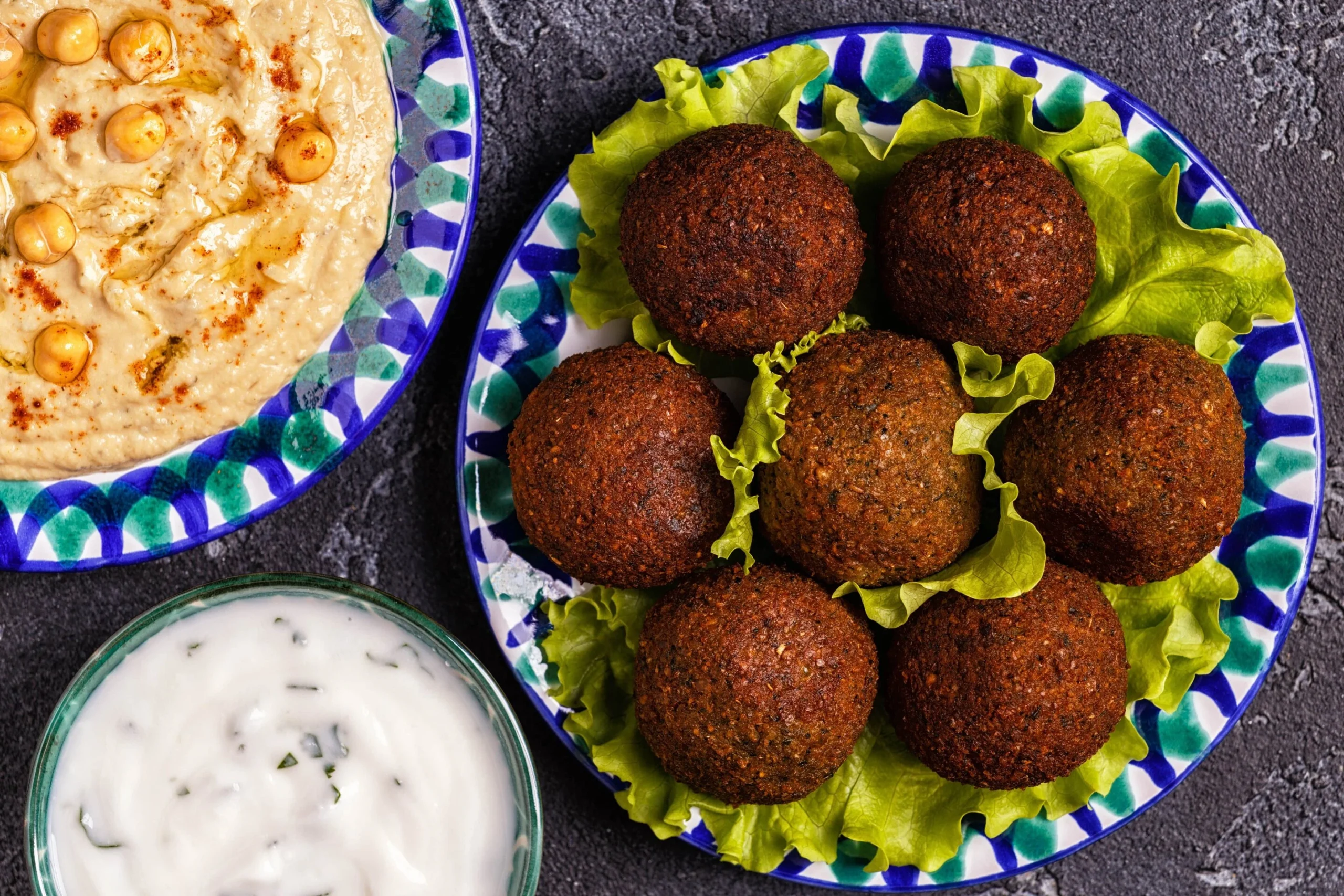Share on social media

Falafel is a traditional Middle Eastern dish made primarily from chickpeas or fava beans, mixed with a rich blend of herbs and spices, then deep-fried to achieve that irresistible golden-brown crust. Chickpeas, also known as garbanzo beans, are a key ingredient in falafel. This might make you question – “Is falafel healthy?”. Is falafel good for you? Its healthiness depends on preparation and ingredient quality. Air-frying and baking on a baking sheet are popular methods for making healthier falafel, reducing fat and calorie content compared to deep-frying. The answer is resoundingly – yes! When prepared with wholesome ingredients and mindful cooking methods, falafel can be part of a healthy, balanced diet.
Falafel is rich in B vitamins and other essential nutrients that support energy production and bone health. The fiber in falafel may help lower the risk of colon cancer. Falafel made from legumes like chickpeas has a low glycemic index, which helps stabilize blood sugar. It is also a plant-based alternative to red meat, offering health benefits such as lower saturated fat and cholesterol.
While the traditional method is deep-frying, this increases the fat and calorie content, leading to a higher risk of obesity and heart disease. Air-frying or baking can help lower this risk by reducing the fat and calorie content, making falafel healthier.
Falafel is often served in a pita pocket, and using whole-wheat pita can increase fiber and nutritional value. Homemade falafel can be a nutritious recipe, especially when served with fresh vegetables and yogurt sauce as a healthy condiment.
Eating falafel with high-sodium toppings like pickled vegetables or excessive salt can increase salt intake and blood pressure, so moderation is essential. Sesame seeds are a common ingredient in falafel and can be an allergen for some people.
The main ingredient, chickpeas, are high in protein and fiber. They keep you full longer, curb hunger and aid digestion. Chickpeas also offer essential micronutrients like iron, magnesium, and potassium. Chickpeas are also rich in B vitamins, which are important nutrients for energy production and overall health. Additionally, chickpeas have a low glycemic index, which helps regulate blood sugar levels.
Falafel also includes fresh herbs and spices. Parsley and cilantro add flavor and antioxidants. Garlic and cumin enhance taste and provide anti-inflammatory benefits.
Common binding agents include flour and baking powder. While these ingredients help hold the mixture together, they don’t add much nutritional value. Chickpea flour is a common binding agent that helps hold the mixture together and adds nutritional value. However, some recipes use healthier alternatives like oat flour.
A food processor is often used to blend the ingredients and achieve the ideal texture for falafel.
Baking falafel reduces the oil content. Placing falafel on a baking sheet ensures even cooking and a crispy texture without excessive fat. Baking is a healthier option for those looking to reduce calorie intake. Baking falafel is a great way to create a nutritious recipe with less oil and fat.
Traditional falafel is deep-fried. This method increases calorie and fat content. Deep-frying falafel raises its fat and calorie content, which may contribute to a higher risk of obesity and heart disease. While falafel made from chickpeas or fava beans is lower in saturated fat than red meat, deep-frying can still increase its saturated fat levels. However, using healthy oils like olive oil can make fried falafel a better option.

Falafel is often served with fresh vegetables, tahini sauce, and whole-grain pita. Traditionally, falafel is enjoyed in a pita pocket or as a falafel pita, making it a convenient and popular meal option. Choosing whole wheat pita can boost fiber content and enhance the nutritional value. These accompaniments add nutrients and balance the meal.
Some people add pickles or hot sauce, and pickled vegetables are also a common topping. While tasty, these can add sodium and sugar to your meal. Pickled vegetables, in particular, can be high in sodium, which may not be suitable for those watching their salt intake. Moderation is key.
Falafel is rich in protein, fiber, and essential vitamins. It also provides vital nutrients, including B vitamins, which support energy production, oxygen delivery to the blood, and overall health. One serving (about three small balls) contains approximately:
Calories: 180
Protein: 6 grams
Fiber: 5 grams
Fat: 10 grams
Carbohydrates: 18 grams
A typical serving size is about a half cup, which can impact calorie and fat intake. The fat and calorie content of falafel can vary depending on the cooking method, with deep-frying increasing these values, while baking or air-frying can help reduce them.
This balance makes falafel a nutritious choice for vegetarians and health enthusiasts. Falafel is also a good source of dietary fiber, which can help lower cholesterol and support healthy cholesterol levels.
Protein is crucial for muscle repair and growth. Falafel provides a plant-based protein source, making it ideal for vegetarians.
Fiber aids digestion and helps maintain healthy blood sugar levels. A high-fiber diet, such as one including falafel, may help reduce the risk of colon cancer. It also keeps you full longer, aiding in weight management.
Falafel contains vitamins and minerals like folate, iron, magnesium, and phosphorus. It is also a good source of B vitamins, which are essential nutrients for energy and metabolism. These nutrients support various bodily functions, including bone health and energy production.
Falafel is not suitable for a keto diet. Its carbohydrate content is too high for those limiting their carb intake.
For a keto-friendly option, consider substituting chickpeas with almond flour or cauliflower. These alternatives can lower the carb content while maintaining flavor.
Falafel is relatively low in calories, especially when baked. The fat and calorie content of falafel depends on the cooking method, with baked or air-fried versions being lower in both compared to deep-fried falafel. Its high fiber content keeps you full, reducing the likelihood of overeating.
Moderation is essential. Overconsumption can lead to weight gain due to its fat content.
Falafel provides a plant-based protein alternative. It is a nutritious substitute for red meat, offering high protein with less saturated fat. It’s free from cholesterol and lower in saturated fats compared to meat.
Falafel has a lower carbon footprint than animal products. Choosing plant-based options can be better for the environment.
Falafel contains both protein and carbohydrates. This balance makes it a versatile food that can fit into various dietary needs.
You can enjoy falafel in different ways—be it as a protein source in salads or a carbohydrate in pita sandwiches. Falafel can also be enjoyed in a falafel pita or pita pocket for a convenient meal.
The high fiber content can be difficult for some people to digest, especially those with sensitive stomachs.
However, a high-fiber diet may help reduce the risk of colon cancer by promoting good digestion and controlling blood sugar levels.
Baked falafel is easier to digest than fried due to its lower fat content.
Falafel has a moderate glycemic index. Chickpeas and fava beans, the main ingredients in falafel, have a low glycemic index, typically ranging between 10 and 40, which means they release glucose steadily and slowly to help with blood sugar control. Its high fiber content helps regulate blood sugar levels, making it a reasonable option for diabetics.
Always consult a healthcare provider for personalized advice.
Traditional fried falafel contains more fat due to the frying process. However, using healthy oils and baking can reduce fat content.
Falafel contains healthy fats from ingredients like olive oil, which can benefit heart health.
Falafel is a nutritious and versatile food that can fit into many different eating styles, from vegetarian and vegan to Mediterranean-inspired and flexitarian diets. Made primarily from chickpeas or fava beans, it offers a valuable combination of plant-based protein, fiber, and essential micronutrients like B vitamins, iron, and magnesium. This makes falafel a satisfying option that supports energy, digestion, and overall health.
However, how “healthy” falafel is will always depend on how it’s prepared and what you serve it with. Traditional deep-fried falafel tends to be higher in fat and calories, which may not be ideal if you’re watching your weight or heart health. Opting for baked or air-fried falafel, using healthy oils, and pairing it with whole-grain pita, fresh vegetables, and lighter sauces like yogurt or tahini in moderation can significantly boost its nutritional profile.
When enjoyed mindfully and in reasonable portions, falafel can absolutely be part of a balanced, everyday diet. Its mix of protein, fiber, and satisfying flavor makes it a smart choice for vegetarians, health-conscious eaters, and curious food lovers looking for a wholesome plant-based alternative to meat.
You might like it